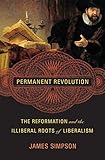Permanent revolution : the Reformation and the illiberal roots of liberalism / James Simpson.
Publisher: Cambridge, Massachusetts ; London, England : 2019Description: xv, 444 pages ; 24 cmISBN:- 9780674987135
- 23 303.64
| Item type | Current library | Collection | Call number | Status | Date due | Barcode |
|---|---|---|---|---|---|---|
| Loanable Book | Library | General Collection | 303.64 SIM (Browse shelf(Opens below)) | Available | 000412021 |
Browsing Library shelves, Collection: General Collection Close shelf browser (Hides shelf browser)

|

|

|

|

|

|

|
||
| 303.625 The infernal machine : | 303.625 The new terrorism : | 303.625 The secret history of al-Qa'ida / | 303.64 SIM Permanent revolution : | 303.64094 MAL History's locomotives : | 303.66 Beyond war : | 303.66 MAC War : |
Includes bibliographical references and index.
The proto-Liberalism of the late seventeenth century in England reverses all the central persuasions of illiberal evangelical religion of the early sixteenth century. Free-will, division of powers, non-literalist Biblical reading, aesthetics, theatricality: each reverses cardinal positions of Lutheran and Calvinist religion. How? Permanent Revolution argues that all revolutions take about 150 years to settle down. In the case of the Reformation in England, the first revolution (what Simpson calls "permanent revolution") was heady and radical. It was also ultimately unsustainable. In about 150 years it produced its opposite, the second Reformation which led to the Enlightenment. In our own times, the author says, liberals make a dangerous mistake when they do not understand that Evangelical fundamentalists descend from the same parent as themselves - the "permanent revolution" of the early Reformation. The core of the book is about the English Reformation and the archive is largely literary. Yet the political and intellectual ramifications exceed the remit of literary studies. The story of the proto-Enlightenment narrated here is not a story of secularist repudiation from outside. Instead, it is primarily a story of transformation and reversal of the Protestant tradition from within. The second Reformation (the one that became the Enlightenment) is less a secularist opponent of the first than its dissident younger sibling, driven and marked, if not scarred, by its older evangelical sibling and competitor.-- Provided by publisher.

There are no comments on this title.